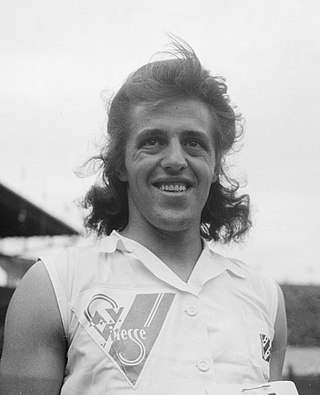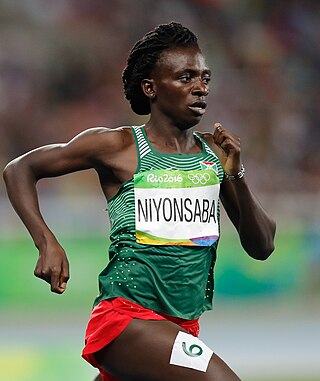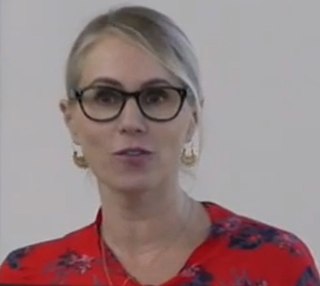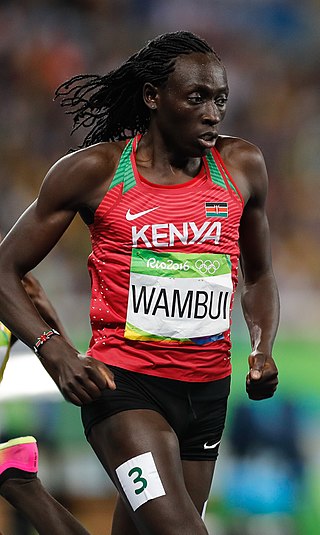The testosterone regulations in women's athletics are a series of policies first published in 2011 by the IAAF (now World Athletics) and last updated following a court victory against Caster Semenya in May 2019. The first version of the rules applied to all women with high testosterone, but the current version of the rules only apply to athletes with certain XY disorders of sexual development, and set a 5 nmol/L testosterone limit, which applies only to distances between 400 m and 1 mile (inclusive), other events being unrestricted.
Athletes are allowed to compete in the restricted events with medical suppression of testosterone (by contraceptive injections or pills, or physical castration), although in practice many have chosen to switch to unaffected events, most notably the 200m. [1]
In 2009, 18 year old Caster Semenya won the women's 800 m World Championship. This caused international headlines, when it was reported that she would be subject to sex testing. [2]
Semenya was cleared to compete again almost a year later. [3] However, she had been told by the IAAF that she would have to suppress her testosterone below 10 nmol/L using medication. [4]
In April 2011, the IOC and IAAF issued statements following meetings between the two. The IAAF issued a new policy for male-to-female transgender athletes, and a second policy on the 'eligibility of females with hyperandrogenism to compete in women's competition'. [5]
The 2011 IAAF 'hyperandrogenism policy' stated that:
The policy mentioned a three step process, the first a physical examination 'including clinical signs of virilization (physical appearance, deepness of voice, body hair etc), genital characteristics (clitoral hypertrophy)', the second a hormone test, principally the androgenic sex steroids, but also possibly other hormones, and the final stage a full genetic test.
An athlete would be eligible to compete if her testosterone level was below 10 nmol/L, OR if she could prove that 'she has an androgen resistance such that she derives no competitive advantage'.
A non-exhaustive list of conditions said to cause hyperandrogenism was provided:
Some of these conditions are XY DSDs, while others are XX conditions.
The permissible testosterone limit was set based on the testosterone levels of women with PCOS, plus a further five standard deviations. [6] 99% of the female athletes at those competitions had testosterone levels below 3.08 nmol/L. [6] However, a study of endocrine profiles in 693 elite female and male athletes published in 2014 found that only 13.7% of the elite female athletes had high levels of testosterone while as many as 16.5% of the elite male athletes had low levels of testosterone. [7] The authors noted that there is "complete overlap of the range of concentrations seen [between the genders]. This shows that the recent decision of the IOC and IAAF to limit participation in elite events to women with a 'normal' serum testosterone is unsustainable."
The rules are and were controversial, with suggestions that such restrictions are discriminatory. [8] There is evidence that women with DSDs from developing countries were subjected to partial clitoridectomies and gonadectomies following the introduction of the regulations. [9]
In 2013 Indian government introduced 'hyperandrogenism regulations' [10] more restrictive than those published by the IAAF. These regulations stated that "intersex female sports persons with elevated androgen production give rise to a particular concern". The regulations provided that such intersex athletes could compete if their testosterone was less than 2 nmol/L, and where the testosterone level was higher than that, they would be subject to a medical panel which would evaluate based on such factors as lack of secondary female sexual characteristics, undescended testes, and other factors.
In June 2014, Dutee Chand, an Indian athlete, was investigated under these regulations, and subsequently excluded from selection for the Indian team. A case was filed with the Court of Arbitration for Sport, [11] and it was found that the IAAF and Indian authorities had failed to prove that the regulations were proportionate, fair and necessary. Therefore, the rules were suspended from 24 July 2015 in an interim ruling.
The suspension of the IAAF test for testosterone levels led to controversy in the Rio 2016 Olympic Games, [12] in particular related to the participation and performance of South African middle distance runner Caster Semenya. Competitors Lynsey Sharp and Joanna Jóźwik spoke out about their belief that Semenya has a competitive advantage. This brought into question the legitimacy of the silver and bronze medallists who were suspected of also having XY-specific Differences of Sexual Development (DSD) like Semenya. Silver medalist Francine Niyonsaba later confirmed having an XY-specific DSD in a 2019 interview. [13] [14]
The 2015 interim CAS ruling gave the IAAF two years to find evidence that endogenous (as distinct from exogenous, aka doping) testosterone is a benefit to female athletes. This was published 10 July 2017, just before two years from the ruling. [15]
The study found that there was no correlation between endogenous testosterone and sporting performance for women in most events. However, for the 400m, 400m hurdles, 800m, hammer and pole vault, a correlation was shown. [16]
The study covered the 2011 and 2013 World Championships. Further to a previous study by the same author [17] covering the 2011 WCs only, where it was noted that there were several samples with testosterone above the normal female level, at least five due to doping, and at least five due to an intersex condition, the 2013 WC was found to have no cases of athletes with high testosterone, as the IAAF rules were being enforced at that time. An accompanying opinion noted that intersex athletes were 140 times more represented in female athletics than in the wider population. [18]
Although the 2017 study found justification for a link between endogenous testosterone and sporting performance 400-800m events, and the hammer and pole vault, the IAAF's next set of rules, published April 2018, covered events 400 m to 1 mile, inclusive, and did not include the hammer or pole vault. Because of this, it was widely suggested that the IAAF were specifically targeting Caster Semenya. [19] [20] [21] [22]
The IAAF rules excluded athletes from competing in the specified events, unless they reduced their testosterone below 5 nmol/L, a lower level of testosterone than previously, suggested to be a more realistic limit for testosterone for women without DSDs. [23] The regulations were published 23 April 2018, to be effective from 1 November 2018.
Unlike the previous regulations, conditions such as PCOS and tumours were no longer included in the restricted conditions, which were:
The list of conditions were now mostly XY DSD, but congenital adrenal hyperplasia was still included.
On 19 June 2018, Semenya announced that she would legally challenge the IAAF rules, and the rules were suspended pending the resolution of the case.
Semenya lost her case, in the Court of Arbitration for Sport on 1 May 2019. During proceedings it was revealed that Semenya has 5α-reductase deficiency, [4] and it was argued that although her hormones are different from both normal male and normal female biology, the advantage afforded by testosterone in the male level is sufficient as to justify the restrictions.
The IAAF also revealed that:
"The DSD Regulations expressly and emphatically stress that they do not connote any judgment or questioning of an individual's sex or gender identity. They are also careful not to spell out that they apply only to 46 XY individuals with fully functioning testes."
Despite this, the IAAF revised the rules [24] to exclude the XX DSD CAH, and released an accompanying statement [25] and FAQ [26] explaining that the regulations ONLY apply to individuals with XY DSDs and testes.
These new rules came into effect on 8 May 2019. [27] [28] The legal case divided commentators such as Doriane Coleman, who testified for the IAAF, arguing that women's sport requires certain biological traits, from commentators such as Eric Vilain, who testified for Semenya, arguing that "sex is not defined by one particular parameter ... for many human reasons, it's so difficult to exclude women who've always lived their entire lives as women — to suddenly tell them 'you just don't belong here.'" [29]
Semenya appealed the decision to the Federal Supreme Court of Switzerland. [30] On 3 June 2019, the Swiss Federal Supreme Court advised that they had "super-provisionally instructed the IAAF to suspend the application of the 'Eligibility Regulations for the Female Classification for athletes with differences of sex development' with respect to the claimant [Semenya]" until the court decides whether to issue an interlocutory injunction. [31] On July 30, 2019, the Swiss Federal Supreme Court reversed its earlier ruling that had suspended the Court of Arbitration for Sport decision and the IAAF rules. For that reason, Semenya, silver medalist Francine Niyonsaba and Olympic bronze medalist Margaret Wambui missed the 2019 World Athletics Championships in Doha in October 2019, while continuing legal appeals. [32] The number 3 ranked 400 meter runner for 2019, Aminatou Seyni had to switch events to a weaker event, the 200 metres, in order to adhere to this rule. [33] On September 8, 2020, the Swiss Federal Supreme Court issued a ruling denying Caster Semenya's appeal. [34] In November 2020 Semenya announced that she will file an appeal against the IAAF testosterone rule at the European Court of Human Rights. [35]
In July 2019, Semenya said that the ongoing issue has "destroyed" her "mentally and physically". [36]
At the 2020 Olympics a number of athletes, all from African countries, were withdrawn from their events because they did not meet the eligibility regulations: [37] [38]
The three 400m runners switched to the 200 m, where Mboma won the silver medal, with Masilingi also reaching the finals, while Seyni was eliminated in the semi-finals. The success of 18-year-old Mboma resulted in further debate about the eligibility of DSD athletes to compete in women's sport, with World Athletics President Sebastian Coe saying that WA would continue to monitor the situation. [1]
Niyonsaba competed in the 5000 m, where she was disqualified for lane infringement after running among the leaders in her heat. [39] Niyonsaba also competed in the 10000 m, where she finished 5th in a National Record.

5α-Reductase 2 deficiency (5αR2D) is an autosomal recessive condition caused by a mutation in SRD5A2, a gene encoding the enzyme 5α-reductase type 2 (5αR2). The condition is rare, affects only people with XY chromosomes, and has a broad spectrum.
World Athletics, formerly known as the International Amateur Athletic Federation and International Association of Athletics Federations and formerly abbreviated as the IAAF, is the international governing body for the sport of athletics, covering track and field, cross country running, road running, race walking, mountain running, and ultra running. Included in its charge is the standardization of rules and regulations for the sports, certification of athletic facilities, recognition and management of world records, and the organisation and sanctioning of athletics competitions, including the World Athletics Championships. The organisation's president is Sebastian Coe of the United Kingdom, who was elected to the four-year position in 2015 and re-elected in 2019 for a second four-year term, and then again in 2023 for a third four-year term.

Sex verification in sports occurs because eligibility of athletes to compete is restricted whenever sporting events are limited to a single sex, which is generally the case, as well as when events are limited to mixed-sex teams of defined composition. Practice has varied tremendously over time, across borders and by competitive level. Issues have arisen multiple times in the Olympic games and other high-profile sporting competitions, for example allegations that certain male athletes attempted to compete as women or that certain female athletes had intersex conditions perceived to give unfair advantage. The topic of sex verification is related to the more recent question of how to treat transgender people in sports. Sex verification is not typically conducted on athletes competing in the male category because there is generally no perceived competitive advantage for a female or intersex athlete to compete in male categories.

Foekje Dillema was a Dutch track and field athlete. She competed in sprinting where she was a rival of Fanny Blankers-Koen. When she refused a sex verification test at age 24, she was banned from competition by the International Association of Athletics Federations in 1950. After her death, it was determined that she was an intersex person.

The Court of Arbitration for Sport is an international body established in 1984 to settle disputes related to sport through arbitration. Its headquarters are in Lausanne, Switzerland and its courts are located in New York City, Sydney, and Lausanne. Temporary courts are established in current Olympic host cities.

Hyperandrogenism is a medical condition characterized by high levels of androgens. It is more common in women than men. Symptoms of hyperandrogenism may include acne, seborrhea, hair loss on the scalp, increased body or facial hair, and infrequent or absent menstruation. Complications may include high blood cholesterol and diabetes. It occurs in approximately 5% of women of reproductive age.

Mokgadi Caster Semenya OIB is a South African middle-distance runner and winner of two Olympic gold medals and three World Championships in the women's 800 metres. She first won gold at the World Championships in 2009 and went on to win at the 2016 Olympics and the 2017 World Championships, where she also won a bronze medal in the 1500 metres. After the doping disqualification of Mariya Savinova, she was also awarded gold medals for the 2011 World Championships and the 2012 Olympics.
Lynsey Sharp is a former Scottish track and field athlete who competed in the 800 metres. She is the 2012 European champion and represented Great Britain at the 2012 Olympic Games in London. She won a silver medal at the 2014 Commonwealth Games. Her personal best is 1:57.69, the seventh fastest time over 800m by a British woman, set in the final of the 2016 Olympic Games in Rio de Janeiro.

Francine Niyonsaba is a Burundian runner who specialized in the 800 metres and shifted to longer distances in 2019. She was the 2016 Rio Olympics silver medalist in the women's 800 metres. Her silver medal was the first Olympic medal for Burundi since 1996. Niyonsaba won a silver in the event at the 2017 World Championships.

Dutee Chand is an Indian professional sprinter and current national champion in the women's 100 metres event. Chand is the first Indian to win a gold medal in 100 m race in a global competition, and in 2016 took part in the Rio Olympic Games. She is the third Indian woman to ever qualify for the Women's 100 metres event at the Summer Olympic Games. In 2018, Chand clinched silver in women's 100m at the Jakarta Asian Games. It was India's first medal in this event since 1998. Moreover, In 2019, she became the first Indian sprinter to win gold at the Universiade, clocking 11.32 seconds in the 100 m race.

Katrina Alicia Karkazis is an American anthropologist and bioethicist. She is a professor of Sexuality, Women's and Gender Studies at Amherst College. She was previously the Carol Zicklin Endowed Chair in the Honors Academy at Brooklyn College, City University of New York and a senior research fellow with the Global Health Justice Partnership at Yale University. She has written widely on testosterone, intersex issues, sex verification in sports, treatment practices, policy and lived experiences, and the interface between medicine and society. In 2016, she was jointly awarded a Guggenheim Fellowship with Rebecca Jordan-Young.

The women's 800 metres event at the 2016 Summer Olympics took place between 17–20 August at the Olympic Stadium.
Maria José Martínez-Patiño is a Spanish former hurdler, whose dismissal from the Spanish Olympic team in 1986 for failing the gender test is a notable moment in the history of sex verification in sports.

Burundi competed at the 2016 Summer Olympics in Rio de Janeiro, Brazil, from 5 to 21 August 2016. This was the nation's sixth consecutive appearance at the Summer Olympics.

Margaret Nyairera Wambui is a Kenyan middle-distance runner specialising in the 800 metres.

Beatrice Masilingi is a Namibian sprinter. At the age of 18, she placed sixth in the 200 metres at the 2020 Tokyo Olympics, having made the final along with fellow Namibian sprinter and eventual silver medallist Christine Mboma. Masilingi won silver medals in both the 100 metres and 200 m at the 2021 World Under-20 Championships.

Christine Mboma is a Namibian sprinter who competes in the 100 metres and 200 m. At the age of 18, she won a silver medal in the 200 metres at the 2020 Tokyo Olympics, becoming the first ever Namibian woman to win a women's Olympic medal and breaking the world under-20 and African senior record. Mboma also won the event at the 2021 World Under-20 Championships and Diamond League final, improving her record mark to 21.78 seconds.
The 2021 Memorial Van Damme was the 45th edition of the annual track and field meeting in Brussels, Belgium. Held on 3 September at the King Baudouin Stadium, it was the thirteenth and penultimate leg of the 2021 Diamond League – the highest level international track and field circuit. The discus throw events were held on 1 September, two days before the rest of the meeting. Although Memorial Van Damme and Weltklasse Zürich co-hosted the finals during the last full season in 2019, in 2021 the series moved to a single final in Zürich.

The Olympic Games mandates sex verification of athletes in women's competitions, and has done since the 1930s. In this time, there have been many different regulations for sex testing, as well as different types of tests used. Initial concerns that prompted the approval of suspicion-based sex testing were of national teams exploiting intersex athletes for Olympic success, and testing first became a requirement in the 1960s when many female athletes were doped and it was harder to tell physical differences between them and men.